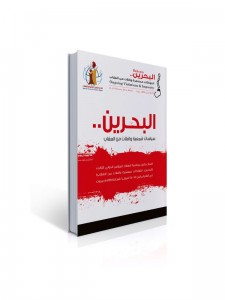January 1st 2014
The situation in Bahrain is a clear example of how human’s blood is viewed less important than oil, power, and political interest.
For the last three years, the government of Bahrain has carried out systematic persecution of the Shia community in this country, yet the media outlets and governments are silent. The government views the Shia majority as a threat to the continued power and control held by the Al-Khalifa family.
Consequently, the government has worked tirelessly to suppress Shia Muslims who have exercised their right to peaceful assembly and expression to call for reforms.
Rather than instituting these reforms, Bahraini authorities have brutally broken up peaceful demonstrations, arbitrarily arrested hundreds of Shia Muslims, and ruthlessly killed dozens more.
Amidst the growing violence following the February 14th uprising, the government of Bahrain was under extreme pressure to amend its immoral practices. As a result, King Hamad appointed the Bahrain Independent Commission of Inquiry (BICI) to investigate possible human rights violations that has been occurring since the early months of the uprising up till now. In November, the BICI released a report that documented a plethora of violations including systematic torture, the destruction of Shia religious sites and widespread employment discrimination.
This report also established a set of recommended reforms that King Hamad promised to implement. Despite the King publicly announcing his success in instituting these reforms, the government has done little to address these issues. Even if the government had successfully implemented these reforms, the BICI report has critical limitations. For example, the report failed to address the role of various individuals and groups that played a major part in the violations. It did not question the role of the King, the Crown Prince, the Prime Minister, the Bahraini Army, or Saudi forces brought in to regain stability.
It also failed to recommend significant steps that must be taken, such as the release of political prisoners, the excessive use of tear gas, or the employment discrimination perpetrated by public and private employers. The report also failed to address systematic injustice that allowed these violations to occur. For example, it does not address the need for an independent judiciary, it does not solve the sectarian tensions between the Sunni minority and the Shia majority. Unfortunately, even if the BICI had addressed these limitations, the government is showing no intention of instituting real reform. Since the report was published in November of 2011, the government has continued to carry out human rights violations against the Shia community.
The systematic torture, the brutal suppression of peaceful demonstrations, the arbitrary arrests, and the ruthless killings have not stopped. Political prisoners are facing torture and mistreatment in prison, while being denied access to a fair trial in court. Shia Muslims and those who oppose the Al-Khalifa regime live in fear of being attacked, detained, or killed.
Furthermore, life has been made extremely difficult for the Shia community. Employment discrimination in both the public and private sector has made it difficult for Shia to obtain stable jobs with reasonable pay. Because the hospitals are run by the military; it is also risky for Shia to go to the hospital for any reasons related to the peaceful protests. Medical professionals will often report any injuries sustained during the demonstrations to the authorities, leading to the arrests of victims of police brutality. Shia Muslims cannot even express their opinions without fear. Anyone openly opposing the system, even on social media, may be arrested and detained. The government has also interfered with the right to practice their own religion, often denying building permits to Shia Mosques, arresting Shia religious leaders, and disrupting religious gatherings. Just as concerning is the treatment of Shia children in Bahraini society. Innocent children have been arrested, tortured, and killed because of their religious beliefs. It is difficult for Shia children to receive an adequate education in Bahrain due to government intervention in the schools.
These violations cannot be allowed to continue. The government of Bahrain must be held accountable for these atrocious acts and immediate action must be taken to encourage meaningful reform. As a member of the United Nations, the Kingdom of Bahrain must begin complying with international law, as well as with their own constitution.
The government has clearly failed to implement the following BICI reforms: It has failed to establish an independent and impartial national commission to implement BICI recommendations, a national independent and impartial mechanism to punish those responsible for deaths, torture, and mistreatment, or an independent body to examine all complaints of torture, excessive use of force, or other abuses by authorities. It has not required the Attorney General to investigate instances of torture or to use independent forensic experts. It also has not worked to reconcile the nation by rebuilding demolished religious structures, developing a national reconciliation program, relaxing censorship of the media, ensuring those that were unfairly dismissed are rehired and integrating personnel from all communities in Bahrain into the security forces. King Hamad’s promise to institute these reforms have proven false, and any claims that the government has corrected its practices are utterly incorrect.
For any real progress to be made, the Bahraini government must immediately fulfill their promise to implement the reforms laid out in the BICI report and furthermore, they must recognize Shia Muslims as rightful citizen with all the rights to criticize and question their government. Shia Muslims have the right to be involved in their government and live in an environment that is full of peace and harmony.
Here is the link for the book if you are interested Click HERE
0



